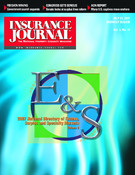Declarations
IPod thunderbolt
“It’s going to hit where it’s going to hit, but once it contacts metal, the metal conducts the electricity.”
Dr. Mary Ann Cooper of the American College of Emergency Physicians and an ER doctor at University of Illinois Medical Center at Chicago comments on some urban myths regarding lightning strikes. When lightning jumps from a nearby object to a person, it often flashes over the skin. But metal in electronic devices — or metal jewelry or coins in a pocket — can cause contact burns and exacerbate the damage. A spokeswoman for Apple Inc., the maker of iPods, declined to comment. Packaging for iPods and some other music players do include warnings against using them in the rain. Lightning strikes can occur even if a storm is many miles away, so lightning safety experts have been pushing the slogan, “When thunder roars, go indoors,” said Cooper. AP
Fender benders
“These bills are anti-consumer. Direct repair programs provide consumers with quality, efficient and convenient repairs to help them get back to their normal lives after what can be a traumatic event.”
John Birkinbine, AIA assistant vice president, Midwest Region comments on Wisconsin legislation that would prohibit an insurance company from recommending one repair shop over another policyholders. “The legislation being promoted under the veil of ‘consumer rights’ actually takes away the customer’s right to choose a higher level of service and a streamlined claims process.” Two bills, Assembly Bill 353 and Senate Bill 181, are to be heard in their chamber’s respective insurance committees and face stiff opposition from insurers, agents and members of the auto repair industry. The proposed legislation would make it illegal for an insurance company representative to provide information about repair options, such as warranties, eliminate an insurer’s ability to negotiate discount rates, and delay the claims process. Current Wisconsin law already prohibits insurers from requiring the use of a specific repair facility as a condition of coverage. At this writing, no further action has been taken by lawmakers.
Goin’ up in smoke
“Appalachian parks, such as Great Smoky Mountains and Shenandoah, provide islands of wilderness in the most populated part of the country. …But the mountains that generations have treasured and relied upon may be fundamentally diminished as a result of climate change.”
A comment by a park advocacy group made in a report contending that climate changes caused by manmade pollutants could have a devastating impact on the country’s national parks. The report highlights potential damage to Tennessee’s and North Carolina’s Great Smoky Mountains.The report, “Unnatural Disaster: Global Warming and Our National Parks,” by the National Parks Conservation Association suggests the effects of global warming on the southern Appalachians may be more subtle than glaciers melting in Alaska, but just as significant.
Topics Legislation
Was this article valuable?
Here are more articles you may enjoy.


 After Falling 6% in 2025, Average Auto Insurance Cost Will Stabilize in 2026, Says Insurify
After Falling 6% in 2025, Average Auto Insurance Cost Will Stabilize in 2026, Says Insurify  Allstate CEO Wilson Takes on Affordability Issue During Earnings Call
Allstate CEO Wilson Takes on Affordability Issue During Earnings Call  Lawyer for Prominent Texas Law Firm Among Victims ID’d in Maine Plane Crash
Lawyer for Prominent Texas Law Firm Among Victims ID’d in Maine Plane Crash  Maine Plane Crash Victims Worked for Luxury Travel Startup Led by Texas Lawyer
Maine Plane Crash Victims Worked for Luxury Travel Startup Led by Texas Lawyer 


